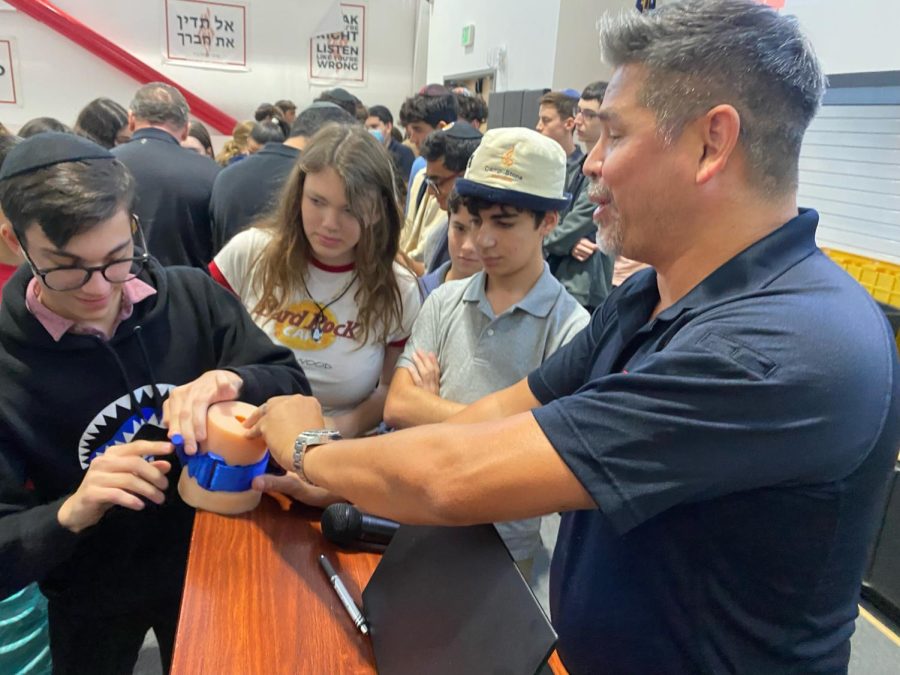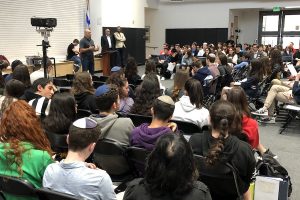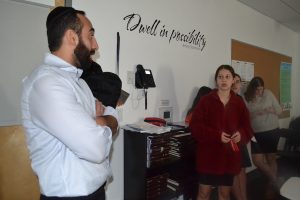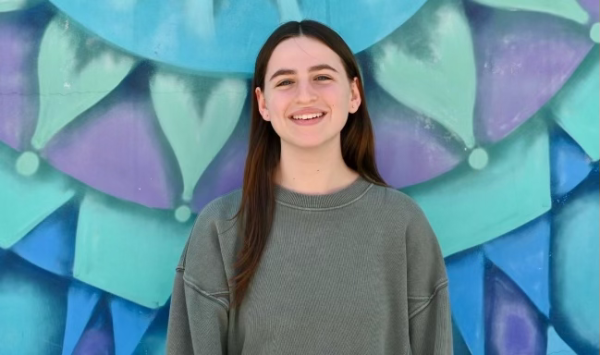Emergency training seeks balance between ignorance and fear
In two-hour assembly, private security company urges situational awareness as school enters fourth year without any drills
PREPARED: Mr. Roque Wicker, president and CEO of C-T Watch Inc., right, demonstrating to senior Zach Rub and freshmen Sarah Goor and Lev Fishman how to use a tourniquet.
November 15, 2022
A counter-terrorism, security and intelligence company trained students for two hours Sept. 21 in tools they might need in an event with an active shooter, along with how to treat severe injuries and the importance of knowing where all the exits are.
The chairs in the gym were packed with students as Mr. Roque Wicker, president and CEO of C-T Watch Inc. of Beverly Hills, and two other C-T Watch members whose names were not revealed for security reasons described what to do in an emergency situation.
After about an hour, they divided students into groups and walked through the top three floors of the building, imagining various types of emergencies that could occur and sharing methods to respond.
“We felt it was important given the climate of what schools need to be proactive for, and we’re building this into our policies and procedures moving forward in terms of it being a regular ongoing thing,” said Principal Mr. Daniel Weslow. “We want to make sure that all stakeholders, when they are on campus, feel safe.”
The speakers tried to steer the students to finding balance between total ignorance and total paranoia. They discussed the importance of keeping calm and level-headed in an emergency instead of panicking.
They also emphasized situational awareness as key for being prepared, for example looking for possible exits whenever entering a room. On the tours of the building, all the exits on each floor were pointed out except for in the basement, which was not included in the tours or elsewhere in the presentation.
The exclusion of the basement, which includes two classrooms, Ed. Support rooms and the office of the Boiling Point, was a surprise to students. Hebrew Club, Model Congress and Mishmar are all held there as well.
Shalhevet Chief Operating Officer Ms. Sarah Emerson said the basement was not shown because of time restraints.
“There’s only so much time that you have to do a walk-through of the building, and the basement is not used as much as the rest of the building, just practically,” Ms. Emerson said in an interview. “And so you have to prioritize the most used parts of the building. But in addition, in terms of looking at a risk analysis, they focused on the parts of the building where they felt students would be more at risk.”
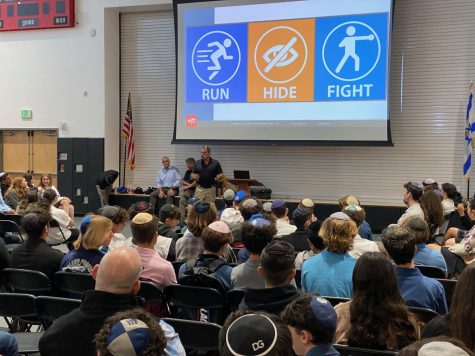
According to the C-T Watch website, the company helps public and private organizations to “understand and assess threats to develop comprehensive risk-based training programs and plans to protect against, prevent, respond to and resolve all hazards to the organization via proven and sound security best practices.”
At the assembly, Mr. Weslow said the school wants safety training to be a “regular ongoing thing.” He stated that now that Covid restrictions have made school more consistent, “that will all take place on a regular basis.
“We’ll set up a rotation for that in terms of fire drills and safety drills,” Mr. Weslow said Sept. 21.
There has been no fire drill since fall 2019 and no earthquake drill at least since before 2010, when the Boiling Point began publishing online. The last lockdown drill was Dec. 20, 2018, which no current Shalhevet students experienced.
“We discussed [doing a lockdown drill] as a team,” Mr. Weslow said. “We’re not doing drills at this point, this is more about information, awareness, and knowledge, and just making sure that everybody is up to date on those pieces. There will be drills in other capacities…down the line, throughout the course of the year.”
Also at the assembly, students were shown how to use tourniquets and had the chance to try it out if they wanted to. The speaker explained how it applies pressure to an artery or vein, which allows the bleeding to stop.
Mr. Weslow said the faculty and staff were given similar safety training at the beginning of the school year, presented by the same company.
“It’s important that students and our faculty really are aware of…things to be mindful of in all situations,” he said.
As of Oct. 25, every classroom – including those in the basement – as well as the theater, Art Room, Robotics lab, College Counseling wing, and both upstairs and downstairs Ed Support rooms all have backpacks with supplies in case of an emergency. Of rooms used by students, only the gym and the Boiling Point office do not.
A Boiling Point survey found out that packs do not contain tourniquets, but they do contain medical and other emergency supplies.
Also speaking at the assembly was Mr. Ivan Wolkind, father of junior Nettie Wolkind. Mr. Wolkind is the Chief Operating and Financial Officer at the Jewish Federation, and has also been on the Shalhevet security task force for 10 years.
Features Editor Amalia Zucker and Community Editor Joshua Gamson contributed to this story.
test2

